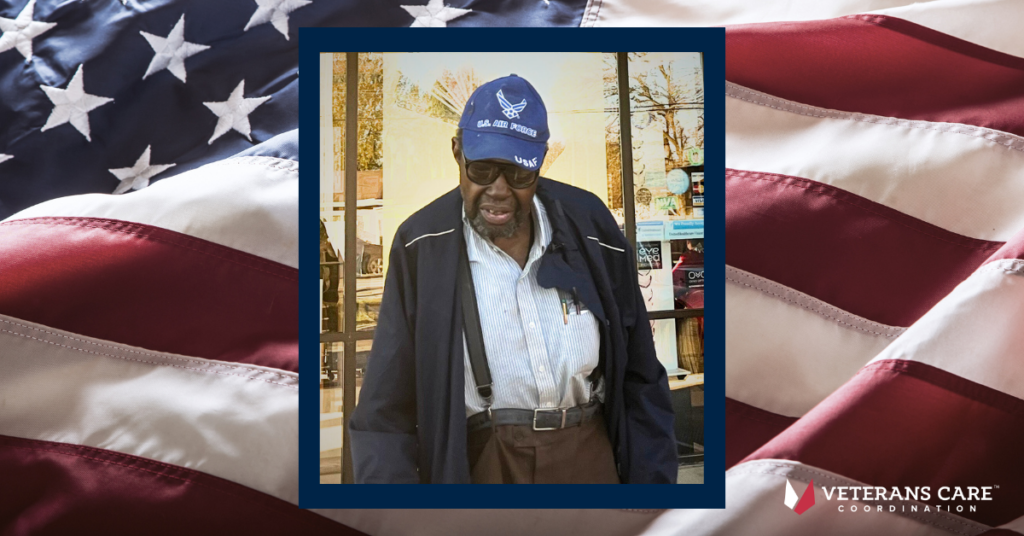Elmus Miller Jr.: Veteran of the Month | February 2025
Elmus Miller Jr. was born in Wellston, Missouri, in 1940. Shortly before his second birthday, his parents divorced, and he moved to Arkansas, where he lived with his grandparents. His family worked on farms, pulling corn and picking cotton, and would often relocate in southeastern Missouri and parts of Arkansas for work. As a child, he enjoyed playing softball and building roller skates and skate trucks, but farmwork involved the entire family. Miller started working at age five and was driving tractors by age nine.
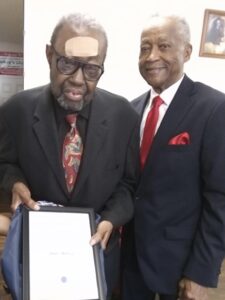
Miller being recognized at New Community Fellowship MB Church for Veterans Day, pictured with Pastor Harold Austin
Eventually, they returned to St. Louis in 1953, where Miller adjusted to city life in Compton Hill. “I had to adjust to city living, and we had a home on the south side in a place called Compton Hill,” Miller recalled. Miller grew up with his older brother but later reconnected with his half-siblings after returning to St. Louis. Throughout grade school and high school, he delivered groceries for local mom-and-pop stores. He attended O’Fallon Technical High School, graduating in 1960 with a certificate in electrical studies. Although integration was established in high schools in St. Louis in 1955, many people and businesses continued to discriminate against the Black population. When Miller started high school, there were approximately 4,000 students, 250 of whom were African American, and the majority did not want them there. Reflecting on his experience, Miller recalled, “You had to fight every day” just to be able to attend class.
Despite earning his skills and graduating, Miller faced significant racial barriers when seeking employment. “You have to remember, jobs for Blacks were few and far between,” he explained. “I graduated from O’Fallon Tech with a skill in the electrical industry, but there wasn’t a single company that was open to us. So I just got tired [of looking] and went into the Air Force.”
Miller decided to follow in the footsteps of his two older brothers, who both served in the military—one in the Army and the other in the Air Force. He enlisted in the U.S. Air Force in September 1960 and completed his basic training at Lackland Air Force Base in San Antonio, Texas. However, he could not escape the challenges of racism. “You had racial strife in there, too, and you had certain areas in San Antonio that you couldn’t go into, but that was nothing new,” he recalled. Despite all the challenges he faced, Miller was determined to work hard and make a significant contribution, something he had done his entire life.
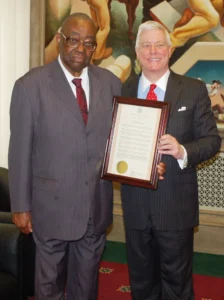
Miller received the Veterans Service Award from Lt. Governor Peter Kinder for his exceptional volunteer service in 2015.
Given the segregation in the military at the time, Black service members were assigned to support roles. Miller chose the Air Police, following his brother’s advice to pick a role that could translate to civilian employment. After basic training and a two-week rest period, he was sent to Blytheville, Arkansas, for on-the-job training, where he had to pass a series of tests to be able to stay and provide security for aircraft, including B-52 bombers and KC-135 refuelers.
Miller was deployed to Morocco during the Cuban Missile Crisis in 1962, where he faced extreme conditions. “It was 140 degrees in the shade,” he recalled. Despite encountering racism while overseas, he remained dedicated to his service. While in Morrocco, his job entailed guarding B47s and KC97s. Through hard work, Miller quickly advanced through the ranks, achieving the rank of Airman First Class (E-4) in just two years, a significant accomplishment for a man of color at that time. Miller stated, “You had to keep your nose clean, keep your head down, and do your work.”
The Vietnam War was just beginning to escalate when Miller had forty days left on his military contract. Initially, the Air Force informed him that his service would be extended, but they reversed that decision as his deployment date approached. As a result, Miller was honorably discharged in September 1964.
While serving in the Air Force, Miller took advantage of every educational course available to him. His military accolades include the SAC Education Award, Air Force Education Award, and Good Conduct Ribbon.
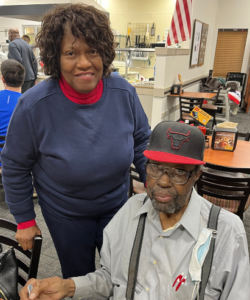
Miller with his niece Yolanda at the Veterans Day dinner in 2024.
After leaving the Air Force, Miller returned to St. Louis, where he continued to face racial discrimination in the workforce. Over the years, he worked in various industries, including managing a liquor store, running a service station, electroplating automotive parts, supervising in the trucking industry, and substitute teaching in the St. Louis and St. Louis County Public Schools. He also worked for the St. Louis County Government processing prisoners. Miller encountered racism at every job. “That’s life; you have to learn how to cope and how to survive, and my folks taught me how to survive,” Miller stated.
Miller played a pivotal role in labor rights, helping to unionize municipal employees in the St. Louis County Government. “They didn’t want it, but the people voted for it, so they didn’t have a choice,” he recalled. His dedication to workers’ rights carried through his career, as he worked with Teamsters in the trucking industry and the International Brotherhood of Electrical Workers (IBEW).
Miller’s dedication to hard work extended beyond the workplace and into the classroom as he pursued higher education. He earned his Associate Degree at Florissant Valley Junior College and his Bachelor’s in Business Labor Relations at Southern Illinois University Edwardsville (SIUE). Additionally, he has completed twenty-seven credit hours toward his Master’s Degree at Webster University and Lindenwood University. Miller stated, “You had to do what you had to do to survive, and I didn’t believe in violence; I believed in legality.”
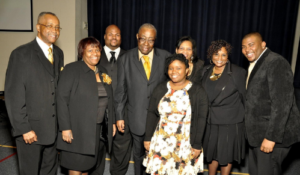
Miller, center, with his fellow board members of the North County Community Development Corporation, has been helping with toy and canned goods drives since 2011.
Miller has always believed in service beyond himself. As a lifelong member of Compton-Hill Missionary Baptist Church, he established a food pantry in 1989 that continues to feed those in need. He has been a trustee at his church since 1966 and a deacon since 2009. His community involvement extends to programs like Toys for Tots and the North County Community Development Corporation, where he serves as a board member. Over the years, he has continuously donated his time, money, and food to help stamp out hunger. His contributions to the community were recognized when he received the Veterans Service Award from Lt. Governor Peter Kinder, honoring his exemplary volunteer service in 2015. When asked what drives him to continuously help those in need Miller humbly said, “I am just an individual that does that type of thing.”
Miller has led an extraordinary life dedicated to serving others, both through his military service and his community efforts. He has two daughters, four grandchildren and two great-grandchildren.
Reflecting on his experience in the Air Force, Miller stated that the biggest lesson the military taught him was “survival.” He explained, “They taught me how to deal with racial prejudice and taught me how to handle people.” During his time in the Air Force, Miller recalled, “I didn’t like it, but I learned how to love it.”
Veterans Care Coordination is proud to recognize Elmus Miller Jr, for his service to our country. We are privileged to have the opportunity to share the stories of our nation’s heroes. Thank you for your service and sacrifices and for continuing to make a difference, Elmus.

